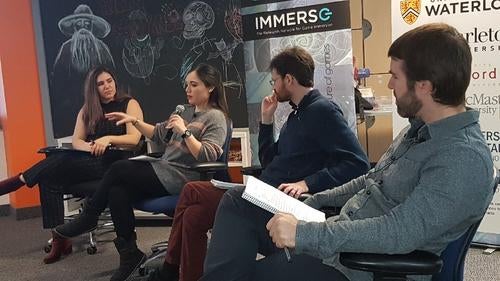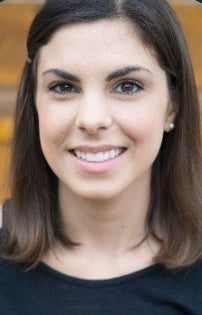Editor:
Brandon Sweet
University Communications
bulletin@uwaterloo.ca
Students highly engaged with new Course Perception Survey
The Student Course Perception Survey, a new survey for students to evaluate courses, was piloted alongside the official course evaluations this Fall Term. Participation rates exceeded expectations, with 42,041 surveys submitted (students could submit one per course)—a response rate of approximately 60 percent when compared to number of surveys submitted for regular end-of-the term course evaluations.
The Course Evaluation Project team point to the support they received from across campus to launch and publicize the pilot, and to the high-level of student engagement and interest in the project. The project team received more than 60 follow-up emails about the pilot-survey.
“I think the new course evaluation appears more effective than the previous, and I am happy that the University is taking on this revision opportunity,” wrote one student.
“I think that the course evaluation is an important part of ensuring courses are well taught,” wrote another.
“I was overwhelmed with the number of students who reached out to me to inquire more about the pilot-test. This, in conjunction with the response rate, is a testament to student engagement in this important process,” says Sonya Buffone, the researcher coordinating the course evaluation project.
Some students expressed concern about the lack of a comments section in the survey. Professor David DeVidi, chair of the Course Evaluation Project Team, explains that the comments section will still be a part of course evaluations, but was removed from the pilot as the goal was to assess the performance of the core questions. “However, this type of feedback from students highlights the sorts of things they value in these evaluations,” says DeVidi.
The project team is now working with the Statistical Consulting and Collaborative Research Unit to analyze the pilot results. They hope to have some idea about what the data has to say early in the new year. DeVidi stresses, “We intend to make it a priority to keep the University community informed about our work, including what we discover as this process unfolds.”
Games Institute panel talks Horizon Zero Dawn

by Marisa Benjamin. This is an excerpt of an article originally posted on the Games Institute website.
On Thursday, December 6, three students from different disciplines came together to share their perspectives on Horizon Zero Dawn (2017). The panel discussion was by no means a debate; rather, it was designed to explore three different approaches to the study of games and to showcase the nuances of curiosity, criticism and analytical methodology.
Horizon Zero Dawn is a popular AAA game set in a post-post apocalyptic world where you play as a female protagonist, Aloy, and use a focus - an Augmented Reality-style interface - to help you battle mechanical animals. The game set the stage for the conversation, but the spotlight was on the panelists.
Karina Arrambide, GI resident and Systems Design Engineering PhD student, studies player behaviours and emotions by applying methodologies from Games User Research. Karina uses biometrics to measure player responses during gameplay in order to determine effective and ineffective game design mechanics. She brought to the panel ideas about how the design elements in Horizon Zero Dawn constructed the relationship between the game and the player.
Nicholas Hobin, GI resident and English PhD student, studies narratives in videogames through the lens of how videogames reflect and manifest processes of conceptualization. His specific focus is on animals in videogames and the cybernetic triangle - the relationship between humans, animals, and machines. Nicholas brought to the conversation theories on the cybernetic triangle in order to analyze how Horizon Zero Dawn constructs, or deconstructs, our relationships to animals and technology.
John Harris, GI resident and Computer Science PhD student, studies player experiences in asymmetric game play. His research focuses on building playful experiences that bring different kinds of players together. His specialized research background allowed him to notice the subtler details of the game mechanics and character designs and he discussed how these parts work together.
The panel began with each speaker sharing their overall impressions on the game. What made the game unique? What were the highlights of the game? And what limitations did it have? Even in these short preambles, the differences in their disciplinary perspectives were clear.
Read the rest of the article on the Games Institute website.
Food Services hires new registered dietitian
A message from Food Services.

UW Food Services would like to welcome Nicole Pin as the department's Registered Dietitian starting January 2, 2019.
In this new role, Nicole will be responsible for developing, implementing and maintaining nutrition programming for Food Services with a focus on health and wellness for the student community. Nicole will be working with our culinary team and service staff to enrich menu development and communication as it pertains to a balanced approach to nutrition.
Nicole’s experience has evolved in her previous work in nutritional consulting for the food services industry including developing food safety initiatives, nutritional strategies and operational improvements. Also, an accomplished nutritional author, Nicole has published many articles on food and the health benefits of balanced eating.
A graduate from the University of Guelph in Applied Science with her Master of Applied Nutrition, Nicole will be a valuable resource to the UWaterloo community. Welcome Nicole!
A holiday message from Environment; other notes
Everyone’s favourite holiday tradition from the Faculty of Environment is back. This year, Environment’s holiday video is a nod to their upcoming 50th anniversary. Watch Dean Jean Andrey as she mixes ingredients (and metaphors), for the recipe to create Canada’s top university faculty devoted to sustainability research, teaching and outreach. Happy holidays from everyone at the Faculty of Environment.
There's no time like the present to work on that golf swing. The golf team is once again offering golf lessons on the UW golf simulator during the winter term.

The cost for the 4 weeks of one-hour lessons is $100. "The money raised will be used to reduce the cost of the teams training trip to Pinehurst and the Canadian University/College Golf Championships," writes assistant coach Dave Hollinger.
There are two sessions with spots available:
- Session One - Sundays (January 20, 27, February 3, 10)
- Session Two - Sundays (March 3, 10, 17, 24)
Time slots are available from 9:00 a.m. to 9:00 a.m. If you would like to book weekday dates around your time schedule this can also be done. Open lesson times for Session One are at 11:00 a.m., noon, 3:00 p.m., 4:00 p.m., 6:00 p.m., 7:00 p.m., and 8:00 p.m. In session Two the open lessons times are 10:00 a.m., 11:00 a.m., 12:00 p.m., 1:00 p.m., 6:00 p.m., 7:00 p.m., and 8:00 p.m.
For more information contact Assistant Coach Dave Hollinger at davehollinger@rogers.com.
Central Stores will provide normal delivery/pickup services for all departments today, however, afternoon delivery and pickup times may change slightly due to a departmental seasonal celebratory lunch.
Upcoming office closures
The Arts Undergraduate Office will be closed today from 8:30 a.m. to 9:30 a.m.
The Engineering Undergraduate Office will be closed today from 11:30 a.m. to 2:30 p.m.
Graduate Studies and Postdoctoral Affairs will be closed today from 11:30 a.m. to 2:00 p.m. for their annual holiday lunch.
Organizational & Human Development will be closed today and on Thursday, December 20 from 9:00 a.m. to 1:00 p.m. (both days)for a planning retreat and holiday celebrations.
Media Resources in MC 1007 will be closing at 3:15 p.m. on Thursday, December 20 for the IST holiday celebration. Regular office hours will resume on Friday, December 21.
Reminder: Take the President's Town Hall survey
Whether you attended the President's Town Hall Meeting on November 21 in person, watched it online, or didn't attend the meeting, University Communications and the President's Office is interested in hearing your views on the meeting format and content.
The President's Town Hall Meeting survey is now open and will run until Friday, December 21.
Your feedback is important and will help enhance future President’s Town Hall meetings.
Link of the day
A president impeached (no, not that one)
When and where
Holiday Luncheon Buffet at the University Club, Wednesday, November 28 to Friday, December 21, 11:30 a.m. to 2:00 p.m., University Club.
Portfolio & Project Management Community of Practice (PPM CoP) session, “Community of Practice: What is it and future direction,” Wednesday, December 19, 9:00 a.m. to 10:30 a.m., East Campus 5 (EC5), 1111.
Master of Business, Entrepreneurship and Technology webinar, Wednesday, December 19, 12:00 p.m. to 1:00 p.m.
UWRC Book Club, “The Steady Running of the Hour” by Justin Go, Wednesday, December 19, 12:00 p.m. to 1:00 p.m., LIB 407.
Retirement celebration for Elsa Woodhall, Thursday, December 20, 4:00 p.m., the Book Store.
On-campus examinations end, Friday, December 21.
Co-operative work term ends, Friday, December 21.
myHRinfo learning and development shutdown, Friday, December 21. Service will be available through Workday as of January 7, 2019.
Casual Time Entry System shutdown, Friday, December 21. Service will be available through Workday in January 2019.
School of Pharmacy graduate studies seminar featuring Professor Heather Mair, Recreation and Leisure Studies, Friday, December 21, 11:00 a.m., PHR 1012.
Grades begin to appear in Quest, Saturday, December 22.
University holiday closure, Monday, December 24 to Tuesday, January 1, 2019, most buildings and operations closed. University reopens Wednesday, January 2, 2019.
Absence Management System shutdown, Monday, December 31. Vacations and absences will be tracked in workday beginning January 7, 2019.
NEW - Engineering Science Quest winter camps, Thursday, January 3 and Friday, January 4, 2019.
More Feet on the Ground - Mental Health Training, Friday, January 4, 2019, 12:30 p.m., NH 2447.
Winter 2019 Orientation, Saturday, January 5, 2019 and Friday, January 11, 2019.
Classes and lectures begin, Monday, January 7, 2019.
Co-operative work term begins, Monday, January 7, 2019.
Chamber Music Ensembles Winter 2019 Auditions open, Monday, January 7, 2019. See https://uwaterloo.ca/music/ensembles for details.
Strategies for Success: SSHRC Insight Development Grant panel presentation for 2019 applications, Monday, January 7, 2019, 12:00 p.m. to 1:30 p.m., HH 373.
Traces: On Displacement, Masterworks Exhibition, Monday, January 7, 2019, 6:30 p.m., Design at Riverside - School of Architecture.
Human Rights, Equity and Inclusion Office presents Ela Smith, “You Don’t Know What You Don’t Know – Part Two,” January 8, 2019, 1:00 p.m. to 4:00 p.m., NH 3318.
Positions available
On this week's list from the human resources department, viewable on the UWaterloo Talent Acquisition System (iCIMS):
- Job ID# 2018-3611 - Administrative Manager and Curriculum Officer - Arts Undergraduate Office, USG 8
- Job ID# 2018-3698 - Grants and Contracts Manager - Office of Research, USG 9
- Job ID# 2018-3470 - Manager, Data, Integration and Analytics - Information Systems and Technology, USG 14
Internal secondment opportunities:
- Job ID# 2018-3724 - Faculty Financial Analyst - Dean of Engineering Office, USG 10
- Job ID# 2018-3676 - Graduate Admissions and Records Specialist - Graduate Studies & Postdoctoral Affairs (GSPA), USG 7
- Job ID# 2018-3708 - Graduate Admissions Specialist - Graduate Studies & Postdoctoral Affairs (GSPA), USG 8
- Job ID# 2018-3722 - Information Systems Specialist (Business Intelligence (BI) Developer) - Information Systems and Technology, USG 10 – 11